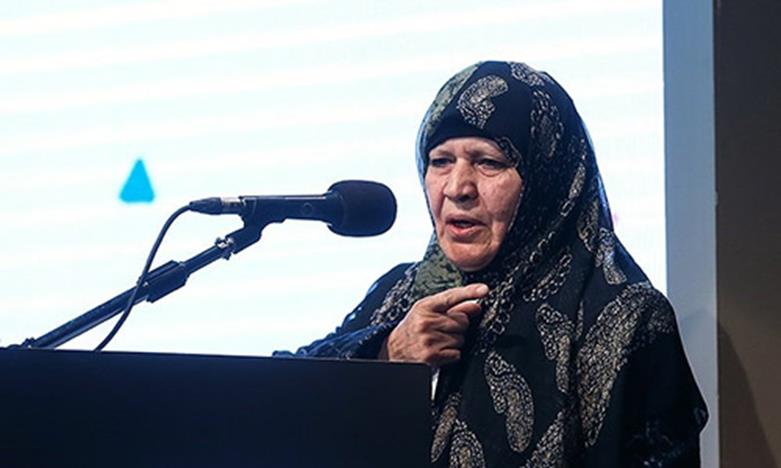Mansoureh Ghadiri Talked about Behjat Afraz
You must be both a mother and a father
Narrator: Mansoureh Ghadiri*
Adjusted by Maryam Rajabi
Translated by Ruhollah Golmoradi
2019-4-16
My wife had the longest captivity and I got the most energy from Ms. Behjat Afraz. I was at the age of 28 when my husband became missing, and when it became clear he was captured, I was very busy and I didn't have leisure time; like a soldier who wears military boot in the morning, I slept upon my book and pamphlet. I was a professor at Shahid Rajaee University and from there I went to Allameh Amini High school as a deputy and when I returned, I tutored mathematic for children of my colleagues and I was not beholden to anyone except God.
My husband was completely missing in early days of his captivity; after a while, a letter came from him; after that, for a year and a half to two years, we did not even have one line letter from him, and when, after this time, a three line letter arrived from My husband, my father read the letter, and while he was just at the age of 57, he stroke a heart attack and we buried him in the morning! In the situation I did not droop my spirit. I resorted to Imam Ali and asked God to help me.
Mrs. Afraz gave a lot of energy to family of the captives and missing people. Shift work did not matter to him at all, and whenever I came from Karaj she was still at work. My field of study was psychological counseling, and for what I was doing, I might feel a little more responsibility than others. Mrs. Afraz sometimes got some resolutions from me in these cases. I remember that I turned back from university and high school one day, and I was very tired. She called me and said you just come here fast. I became worried and asked anything happened to Morsal? She said no, she told it is about wife of one of the captive.

When I arrived, I saw that a young woman sat there and had a beautiful girlfriend photo in her hand, and brought oil to burn herself! Mrs. Afraz, who was so solvent of problems, no longer knew what she should do in front of this woman. She asked me to tell her some of my problems to calm her down. I went into the room and talked to him. I put Quran in front of him, and finally I convinced him and said, "Do you think if you kill yourself, problem of this kid would be solved?" No! You must be both a mother and a father.
________________________________________
* Mansureh Ghadiri is wife of freedman Major General Morsal Ahangari. His spouse was captured by Saddam's army for ten years. Ms. Ghadiri was selected as a sample counselor in the country and has 31 years of service in education. She also has worked as a faculty member at Shahid Rajaee University, a manager and deputy in various high schools, and a 10-year psychology counselor at vocational schools and high schools. Mansoureh Ghadiri spoke in the program "Lady of Rain: Commemoration of Behjat Afraz, Om ol-Osara (mother of prisoners of the war)", which was held in Sooreh Hall of Hozeh Honari on the evening Wednesday, March 6, 2019.
Number of Visits: 5477








The latest
- The Role of Objects in Oral Narrative
- The 372nd Night of Memoires– Part 2
- Third Regiment: Memoirs of an Iraqi Prisoner of War Doctor – 8
- 100 Questions/7
- Managing Oral History Interviews
- The 372nd Night of Memories – Part 1
- Third Regiment: Memoirs of an Iraqi Prisoner of War Doctor – 7
- Objects Tell What Happened in the Eight-Year War!
Most visited
Comparing the Narratives of Commanders and Ordinary Combatants in the Sacred Defense
An Analysis of Functions and ConsequencesThe experience of the Sacred Defense cannot be comprehended merely through statistics or official reports; what truly endures from war are the narratives of those who stood upon its frontlines. These narratives, however, vary significantly depending on one’s position, responsibilities, and lived experience.
Unveiling of the book "Oral History: What and Why"
The First report: Alireza KamariAccording to the Oral History website, the unveiling ceremony of the book "Oral History: What and Why" by Hamid Qazvini was held on Sunday evening, November 24, 1404, in the presence of experts in the field of oral history in the Salman Farsi Hall of the Arts Center.
Mohammad — The Messiah of Kurdistan
Boroujerdi immediately said to Darvish, “Ready a few men; we’re going.” Then he moved toward Mostafa, who was studying the Kurdistan map. Mostafa straightened his back and said, “During my service in the army I experienced a full-scale war in Kurdistan. Guerrilla warfare in Kurdistan follows its own rules. The anti-revolutionary commanders want to draw us into a battle chosen on their terms.”

